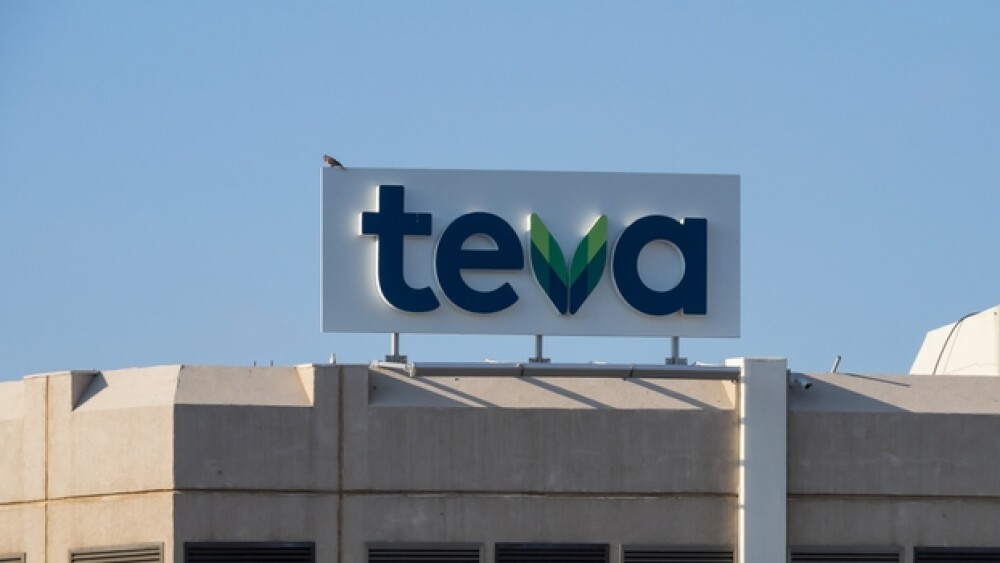Teva announced that it had reached a deal with Lupin over Lupin’s Abbreviated New Drug Application (ANDA) for generic deutetrabenazine - an upcoming competitor to Hungtington’s drug Austedo.
photobyphm/shutterstock
Teva Pharmaceutical Industries reported its first-quarter 2022 financial results, with revenues for the quarter of $3.7 billion. This was a drop of 8%, largely due to decreased sales in North America fort the company’s generic drugs and its own multiple sclerosis therapeutic, Copaxone. European revenue dropped 5% to $1.16 billion, despite Ajovy sales doubling to $30 million.
The Tel Aviv, Israel-based company also announced that it and Auspex Pharmaceuticals had reached a deal with Lupin over Lupin’s Abbreviated New Drug Application (ANDA) for generic deutetrabenazine. Teva alleged Lupin had infringed on several of its patents for Austedo. Austedo is the first and only drug approved by the U.S. Food and Drug Administration to treat both tardive dyskinesia in adults and chorea associated with Huntington’s disease.
Under the terms of the settlement, the litigation between the two companies in the U.S. District Court for the District of New Jersey will end. Lupin will hold a license to sell its generic drug starting April 2033 or earlier if certain conditions are met.
Teva plans to continue its litigation against Aurobindo over Aurobindo’s ANDA for a generic deutetrabenazine drug.
Teva also indicated in its quarterly report that it had paid $1.1 billion in the quarter for legal settlements and loss contingencies regarding opioid cases in Florida and Rhode Island. Reuters reported on March 31 that Florida had settled with CVS Health Corp and three drug companies, including Teva, over claims related to opioid litigation. CVS will pay $484 million, Teva will pay $194.8 million, AbbVie’s Allergan unit will pay $134.2 million and Endo International will pay $65 million.
The $117 million will be paid to Florida over 15 years and includes making doses of Narcan (naloxone hydrochloride nasal sprays) available to the state over 10 years.
CVS and Teva indicate they will defend against other opioid lawsuits, with Teva stating it was “actively” negotiating a national settlement of similar claims.
The Florida settlement came nine days after Rhode Island made similar agreements with Teva and Allergan worth about $107 million. On Teva’s part, the company will pay Rhode Island $21 million, as well as $78.5 million worth of generic drugs that help opioid addiction and recovery, including Narcan and buprenorphine naloxone (brand name Suboxone).
The opioid lawsuits, which have tangled a number of drug companies, including Johnson & Johnson, allege the companies took part in misleading marketing of opioids and downplayed addiction risks.
Otherwise, Teva has projected its 2022 revenue downward slightly, from a range of $15.6 to $16.2 billion to a range of $15.4 billion to $16.0 billion. GAAP gross profit was $1.740 billion for the quarter, a drop of 7% compared to the first quarter of 2021.
Generic product revenues in North America, including biosimilars, were $899 million for the quarter, a drop of 15% compared to the first quarter of the previous year. The company indicates this was mainly due to increased competition on key products and lower volumes. However, it was partially offset by higher revenues from its generic version of Revlimid (lenalidomide capsules) and Truxima.
“2022 is off to a solid start with the successful launch of a first generic version of Revlimid in the United States, and gains in market share for Ajovy both in the United States and in Europe, where it has solidified its leadership position as the second leading brand,” Kåre Schultz, Teva’s president and chief executive officer said. “Austedo continues to grow as more patients with tardive dyskinesia are being diagnosed and receiving treatment. We are also pleased to continue resolving opioid-related litigations with recent settlements in Florida and Rhode Island including the provision of lifesaving opioid treatments and recovery medicines for those who need them.”





